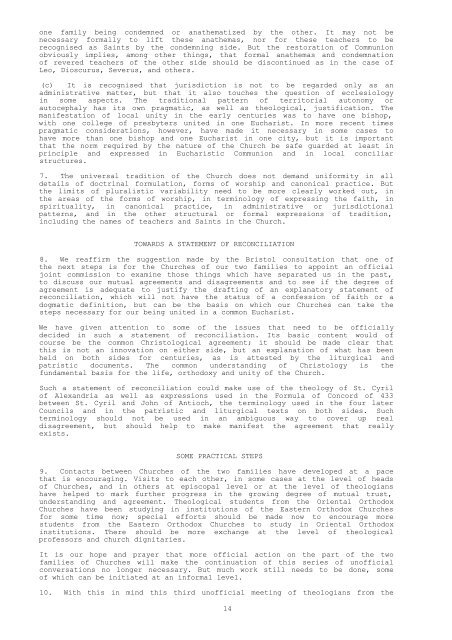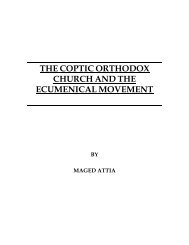Coptic interpretations of the Fourth Ecumenical Council - Saint Mina ...
Coptic interpretations of the Fourth Ecumenical Council - Saint Mina ...
Coptic interpretations of the Fourth Ecumenical Council - Saint Mina ...
Create successful ePaper yourself
Turn your PDF publications into a flip-book with our unique Google optimized e-Paper software.
one family being condemned or ana<strong>the</strong>matized by <strong>the</strong> o<strong>the</strong>r. It may not be<br />
necessary formally to lift <strong>the</strong>se ana<strong>the</strong>mas, nor for <strong>the</strong>se teachers to be<br />
recognised as <strong>Saint</strong>s by <strong>the</strong> condemning side. But <strong>the</strong> restoration <strong>of</strong> Communion<br />
obviously implies, among o<strong>the</strong>r things, that formal ana<strong>the</strong>mas and condemnation<br />
<strong>of</strong> revered teachers <strong>of</strong> <strong>the</strong> o<strong>the</strong>r side should be discontinued as in <strong>the</strong> case <strong>of</strong><br />
Leo, Dioscurus, Severus, and o<strong>the</strong>rs.<br />
(c) It is recognised that jurisdiction is not to be regarded only as an<br />
administrative matter, but that it also touches <strong>the</strong> question <strong>of</strong> ecclesiology<br />
in some aspects. The traditional pattern <strong>of</strong> territorial autonomy or<br />
autocephaly has its own pragmatic, as well as <strong>the</strong>ological, justification. The<br />
manifestation <strong>of</strong> local unity in <strong>the</strong> early centuries was to have one bishop,<br />
with one college <strong>of</strong> presbyters united in one Eucharist. In more recent times<br />
pragmatic considerations, however, have made it necessary in some cases to<br />
have more than one bishop and one Eucharist in one city, but it is important<br />
that <strong>the</strong> norm required by <strong>the</strong> nature <strong>of</strong> <strong>the</strong> Church be safe guarded at least in<br />
principle and expressed in Eucharistic Communion and in local conciliar<br />
structures.<br />
7. The universal tradition <strong>of</strong> <strong>the</strong> Church does not demand uniformity in all<br />
details <strong>of</strong> doctrinal formulation, forms <strong>of</strong> worship and canonical practice. But<br />
<strong>the</strong> limits <strong>of</strong> pluralistic variability need to be more clearly worked out, in<br />
<strong>the</strong> areas <strong>of</strong> <strong>the</strong> forms <strong>of</strong> worship, in terminology <strong>of</strong> expressing <strong>the</strong> faith, in<br />
spirituality, in canonical practice, in administrative or jurisdictional<br />
patterns, and in <strong>the</strong> o<strong>the</strong>r structural or formal expressions <strong>of</strong> tradition,<br />
including <strong>the</strong> names <strong>of</strong> teachers and <strong>Saint</strong>s in <strong>the</strong> Church.<br />
TOWARDS A STATEMENT OF RECONCILIATION<br />
8. We reaffirm <strong>the</strong> suggestion made by <strong>the</strong> Bristol consultation that one <strong>of</strong><br />
<strong>the</strong> next steps is for <strong>the</strong> Churches <strong>of</strong> our two families to appoint an <strong>of</strong>ficial<br />
joint commission to examine those things which have separated us in <strong>the</strong> past,<br />
to discuss our mutual agreements and disagreements and to see if <strong>the</strong> degree <strong>of</strong><br />
agreement is adequate to justify <strong>the</strong> drafting <strong>of</strong> an explanatory statement <strong>of</strong><br />
reconciliation, which will not have <strong>the</strong> status <strong>of</strong> a confession <strong>of</strong> faith or a<br />
dogmatic definition, but can be <strong>the</strong> basis on which our Churches can take <strong>the</strong><br />
steps necessary for our being united in a common Eucharist.<br />
We have given attention to some <strong>of</strong> <strong>the</strong> issues that need to be <strong>of</strong>ficially<br />
decided in such a statement <strong>of</strong> reconciliation. Its basic content would <strong>of</strong><br />
course be <strong>the</strong> common Christological agreement; it should be made clear that<br />
this is not an innovation on ei<strong>the</strong>r side, but an explanation <strong>of</strong> what has been<br />
held on both sides for centuries, as is attested by <strong>the</strong> liturgical and<br />
patristic documents. The common understanding <strong>of</strong> Christology is <strong>the</strong><br />
fundamental basis for <strong>the</strong> life, orthodoxy and unity <strong>of</strong> <strong>the</strong> Church.<br />
Such a statement <strong>of</strong> reconciliation could make use <strong>of</strong> <strong>the</strong> <strong>the</strong>ology <strong>of</strong> St. Cyril<br />
<strong>of</strong> Alexandria as well as expressions used in <strong>the</strong> Formula <strong>of</strong> Concord <strong>of</strong> 433<br />
between St. Cyril and John <strong>of</strong> Antioch, <strong>the</strong> terminology used in <strong>the</strong> four later<br />
<strong>Council</strong>s and in <strong>the</strong> patristic and liturgical texts on both sides. Such<br />
terminology should not be used in an ambiguous way to cover up real<br />
disagreement, but should help to make manifest <strong>the</strong> agreement that really<br />
exists.<br />
SOME PRACTICAL STEPS<br />
9. Contacts between Churches <strong>of</strong> <strong>the</strong> two families have developed at a pace<br />
that is encouraging. Visits to each o<strong>the</strong>r, in some cases at <strong>the</strong> level <strong>of</strong> heads<br />
<strong>of</strong> Churches, and in o<strong>the</strong>rs at episcopal level or at <strong>the</strong> level <strong>of</strong> <strong>the</strong>ologians<br />
have helped to mark fur<strong>the</strong>r progress in <strong>the</strong> growing degree <strong>of</strong> mutual trust,<br />
understanding and agreement. Theological students from <strong>the</strong> Oriental Orthodox<br />
Churches have been studying in institutions <strong>of</strong> <strong>the</strong> Eastern Orthodox Churches<br />
for some time now; special efforts should be made now to encourage more<br />
students from <strong>the</strong> Eastern Orthodox Churches to study in Oriental Orthodox<br />
institutions. There should be more exchange at <strong>the</strong> level <strong>of</strong> <strong>the</strong>ological<br />
pr<strong>of</strong>essors and church dignitaries.<br />
It is our hope and prayer that more <strong>of</strong>ficial action on <strong>the</strong> part <strong>of</strong> <strong>the</strong> two<br />
families <strong>of</strong> Churches will make <strong>the</strong> continuation <strong>of</strong> this series <strong>of</strong> un<strong>of</strong>ficial<br />
conversations no longer necessary. But much work still needs to be done, some<br />
<strong>of</strong> which can be initiated at an informal level.<br />
10. With this in mind this third un<strong>of</strong>ficial meeting <strong>of</strong> <strong>the</strong>ologians from <strong>the</strong><br />
14








